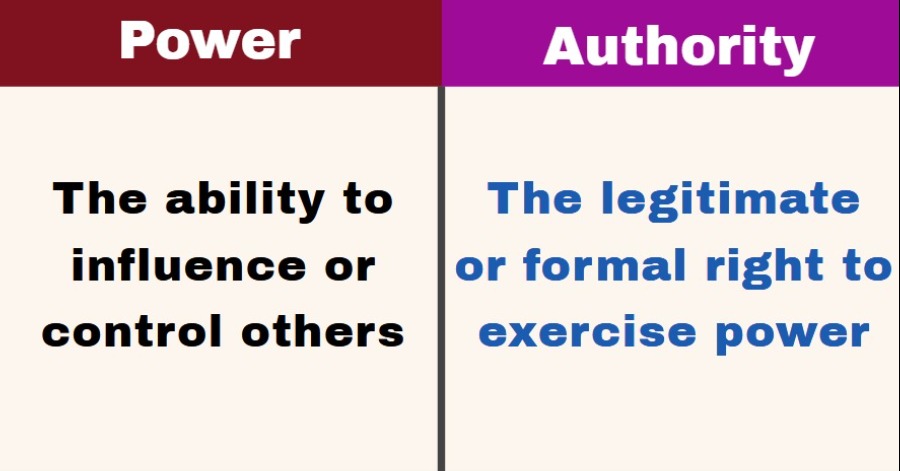Understanding the difference between power and authority is essential for comprehending how individuals and institutions exert control in various settings. While power and authority have their differences, they often intersect and influence each other in practice. Individuals in positions of authority can wield power, and those with power can exert influence that resembles authority. The dynamics between power and authority can shape relationships, organizations, and societies in significant ways.
What is power?
Power refers to the ability or capacity of an individual, group, or entity to exert influence, control, or effect change over others or a particular situation. It involves having the means or resources to shape the behavior, decisions, or outcomes of others in a desired manner.
What is authority?
Authority refers to the legitimate or formal right granted to an individual, institution, or governing body to exercise power, make decisions, enforce rules, and influence the behavior of others within a defined domain or context. It is typically derived from a recognized position, role, or social structure that grants the individual or entity the right to exercise control or take action.
Difference between power and authority in a tabular form
| Aspects | Power | Authority |
|---|---|---|
| Definition | The ability to influence or control others | The legitimate or formal right to exercise power |
| Source | Can be acquired through various means, including coercion, physical strength, wealth, knowledge, or charisma | Derived from a formal position, role, or social structure, such as a government, organization, or legal system |
| Nature | Can be both formal and informal | Primarily formal |
| Basis | Can be based on personal attributes, resources, or situational factors | Based on a recognized position or title |
| Legitimacy | May or may not have legitimacy | Derived from the legitimacy of the position or role |
| Scope | Can be exercised both within and outside formal structures | Typically limited to a specific domain or organization |
| Duration | Can be temporary or permanent | Generally remains in place as long as the position or role exists |
| Accountability | May or may not be accountable for their actions | Accountable for their actions and decisions within the defined scope |
| Example | A mob leader wielding power over their followers | A government official exercising authority within their designated jurisdiction |
There are many types of power. Such as:
- Coercive Power: Power derived from the ability to punish or impose negative consequences on others.
- Reward Power: Power derived from the ability to provide incentives, rewards, or benefits to others.
- Legitimate Power: Power that comes from a formal position, title, or authority within a social or organizational structure.
- Expert Power: Power gained from possessing specialized knowledge, skills, or expertise in a particular domain.
- Referent Power: Power acquired through admiration, respect, or personal connection, often associated with charisma or influence over others.
The basis of authority often lies in established norms, laws, regulations, or social agreements that confer certain powers and responsibilities to specific individuals or institutions. Authority provides a framework for governance, decision-making, and maintaining order within societies, organizations, or other structured systems.
Key characteristics of authority include:
- Legitimacy: Authority is perceived as legitimate when it aligns with the accepted rules, norms, or principles of a given social or organizational system. Legitimacy is often derived from a broader social consensus, legal framework, or cultural expectations.
- Accountability: Those who possess authority are generally accountable for their actions and decisions within their defined scope. They may be subject to scrutiny, oversight, or evaluation to ensure that their exercise of authority aligns with the intended purpose and serves the best interests of those affected by their decisions.
- Scope and Limitations: Authority is typically limited to a specific domain or jurisdiction. It may have defined boundaries within which it can be exercised, such as a government official’s jurisdiction, a manager’s authority over a specific department, or a judge’s authority within a legal system.
- Formality: Authority is often associated with formal positions, titles, or roles within structured systems. It is recognized and granted by the relevant social or organizational structure, such as governments, institutions, or legal frameworks.
Difference between power and authority
Power and authority are essential concepts in understanding how influence and control operate within various social, political, and organizational contexts. Power refers to the ability to influence or control others and can be acquired through various means, such as coercion, wealth, knowledge, or charisma. It can be both formal and informal and may or may not have legitimacy. Power can be temporary or permanent and can be exercised within or outside formal structures.
On the other hand, authority is the legitimate or formal right to exercise power derived from a recognized position or role within a social or organizational structure. It is primarily formal and is based on a position or title. Authority has legitimacy and accountability, being accountable for actions and decisions within the defined scope. While power and authority can intersect and overlap, recognizing their distinctions is crucial for navigating relationships, fostering accountable leadership, and working towards more equitable systems of governance.
Read More:
Difference between data and information
Differences Between Assessment and Evaluation


Leave a Reply